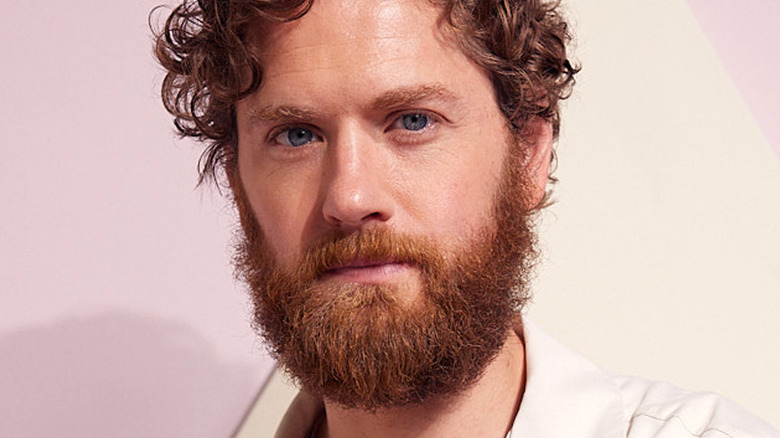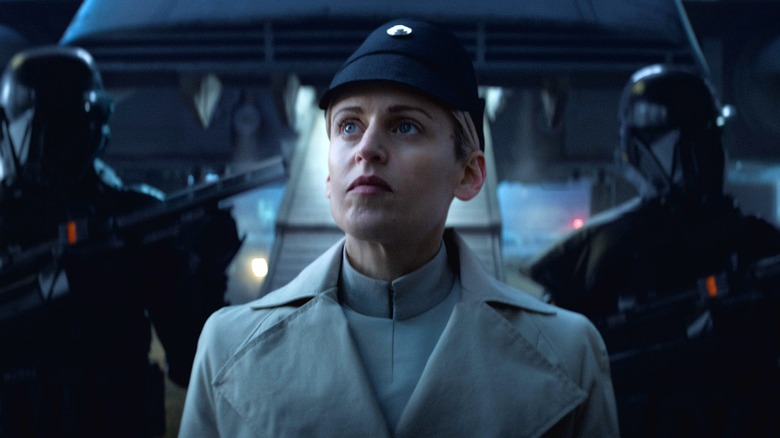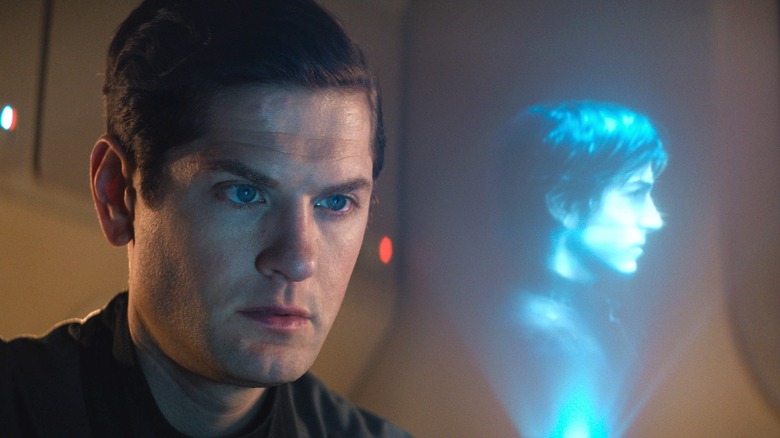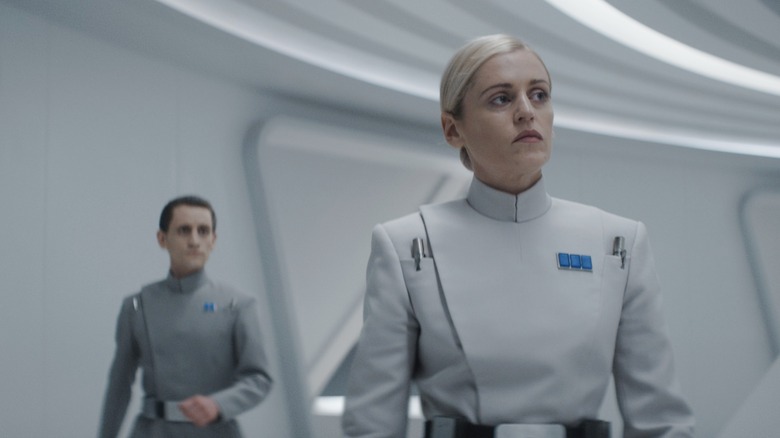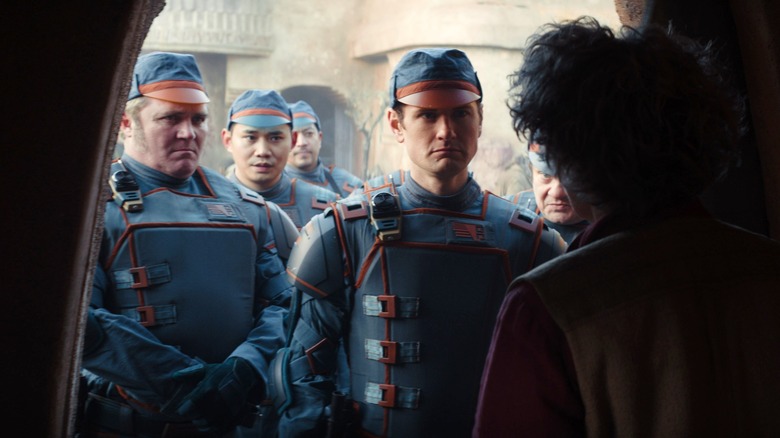Andor's Denise Gough And Kyle Soller On Their Characters' Motivations In The New Star Wars Series - Exclusive Interview
The Rebellion in the "Star Wars" universe begins in earnest with the "Rogue One: A Star Wars Story" prequel series "Andor" — named, of course, for the soldier-turned-spy Cassian Andor (Diego Luna), who was introduced in the 2016 film. While Cassian finds new allies with the likes of Mon Mothma (Genevieve O'Reilly), Saw Gerrera (Forest Whitaker), Bix Caleen (Adria Arjona), and Luthen Rael (Stellan Skarsgård), there are Imperial officers he will also encounter, including the formidable Dedra Meero (Denise Gough) and the dedicated yet increasingly conflicted Syril Karn (Kyle Soller).
While Gough and Soller are both new to the "Star Wars" experience, they both bring years of showbiz acumen to "Andor." Gough has starred in nearly 60 screen roles since 2004, most recently appearing opposite Sam Worthington and Daisy Edgar-Jones in the Andrew Garfield detective thriller "Under the Banner of Heaven." Soller, meanwhile, has appeared in more than 30 projects since 2010, making his film debut in the Keira Knightley version of "Anna Karenina," and on TV, he's starred in such series as the BBC's "Poldark."
In an exclusive interview with Looper, Gough and Soller discussed their thoughts about joining the evil Empire in the "Star Wars" universe and the conflicts that go with it. They also revealed the different screen characters who helped influence their performances, and Gough made a stunning admission about her previous experiences with the "Star Wars" films and TV series.
Gough likes that her character has power, but says you can't root for her
Both of you deliver wonderful performances in "Andor" — you can tell that there's something going on up there in your minds. Denise, your Imperial officer, Dedra Meero, is a female in this male power structure, and you want to go about things a little bit differently. It's got to be great to get into a role, again, where as a viewer, I can see there's something going on in your mind.
Denise Gough: What's great [is] for me to be able to play a character who you can see the conflicts in for sure. She's a woman in a man's world, and you sort of get behind her; you want her to succeed. But then you're faced with the reality that you're hoping that a woman will rise up in the ranks of a fascist organization. What I love is that we're showing that the effect of power and ambition has the same effect, whether you're a man or a woman — and if you're coming from anything like what Dedra is coming from, which is a sense of lack and her need for control, then you can be a very dangerous force if you're given power.
I'm really enjoying that. We're going to get to see a woman in that position so that we show that it's not a gender thing, it's a power thing. The pursuit of power from a place of lack is a dangerous venture for anyone. It can have super dangerous results. Certainly, when I started reading the beginning, I was like, "I want her to do well. Oh, no, actually I don't. She's bad. Is she bad?" But everyone has light and shade, and we've been saying Cassian does some really questionable things as a hero. What you want to bring to a villain character is a sense of humanity, but for the grace of whatever you believe in going.
A character full of conflicts
There's probably a little bit more hope for your character, Kyle. Syril Karn starts off pretty menacing, but he hits a wall at some point. All of a sudden, as a viewer, I'm seeing those wheels turning in your mind where you think, "Maybe this guy could turn if he's given the chance."
Beautiful [that you picked that up]. That's one of the things that attracted me to the character, which was this, "Is he, isn't he?" Which side — could he be a part of either side?
Certainly, where we see him when he starts out is ambitious and quite desperate to prove himself and also [wanting to] raise the level of expertise around him and achieve something that no one else can, which is capturing Cassian. Then when he experiences that disappointment and that severe loss, the doubt does start to creep in, and he can go after Cassian because he has nothing left to lose. He came from nothing [and] is nothing to write home about. But when all that is gone, he then faces the next biggest question of his life, which is, "What do I do now?"
A Breaking Bad villain helped influence Dedra
Both of your characters definitely start out as Imperials. Was there anything either of you did to wrap your mind around being a menacing character in the evil Empire? Were either one of you influenced by specific "Star Wars" villains we've seen before?
Gough: No, because I'd never seen "Star Wars." I knew about Darth Vader, obviously, and I knew about Palpatine because I worked with Ian McDiarmid [on the London stage in "Six Characters in Search of an Author"]. I knew there was baddies and goodies and the Dark Side and the Light Side, but I wasn't an aficionado of any of this stuff. But I tell you who had a profound effect on me as a villain in TV — Gus Fring from "Breaking Bad" and that sense of meticulous detail and cleanliness that he has in his actions.
When I got into Dedra, it was obvious, in the same way as when she finally meets Syril. They see kindred spirits in each other, this sort of OCD level of, "I need things to be better. I need things to be really, really excellent." But it was better for me [coming into the series] in that I wasn't somebody who was totally influenced by "Star Wars," because I approached this like I would approach a new play that I'm working on.
It's like new writing, great writing. It just so happens that it's "Star Wars." That's what was so amazing about it. I didn't think it was the right fit for me until I read the first three scripts, and I'm not even in [the episodes]. I was like, "Oh, no, hang on. This is not science fiction. It's great writing," and it's "Star Wars." It's only the last few days that I'm suddenly realizing I'm actually in "Star Wars."
Soller looked to Rogue One to prepare for his performance
Kyle, were you into "Star Wars" before being cast, and were there villains within, Darth Vader or whomever, who influenced you to bring the evil to your character?
Soller: I watched the films — the original trilogy — growing up every weekend with my brothers, and I'm sure that existed somewhere in the background. Those characters are always around on the "Star Wars" set. They live within the ether, but I didn't use one to model off of. Watching "Rogue One" was useful for both of us. Ben Mendelsohn's performance in that is amazing. He's one of the best actors ever.
Gough: You could see the tribe that you're in.
Soller: Exactly. You can see, "Oh, yeah, we could hang out as 'Star Wars' villains and stuff." But they're all crafted in different ways ... especially this, as you were saying, Denise. What [creator and writer] Tony [Gilroy] has done is created deep, three-dimensional characters that are conflicted and are questioning who they are.
Gough: They each have a particular kind of skill. Syril and Dedra have a very similar type of mindset that is specific to both of them, but individually, they have a different ... There's no doubt to me that Dedra is quite dark. If given enough power, Dedra is divorced from empathy and compassion. It's just not something that she has, whereas maybe there is more of a conflict in Syril. I can't speak to that, but I know that in the villainous world of "Star Wars," if you put us all together, we could stand up pretty tall in amongst those that have already gone before us. Adam Driver did something quite — didn't he do something really interesting with his character?
Soller: Yes.
Gough: But I haven't seen it, though. I don't know!
"Andor" debuts with a three-episode premiere on Disney+ on September 21, with new episodes dropping every Wednesday through November 23.
This interview was edited for clarity.
